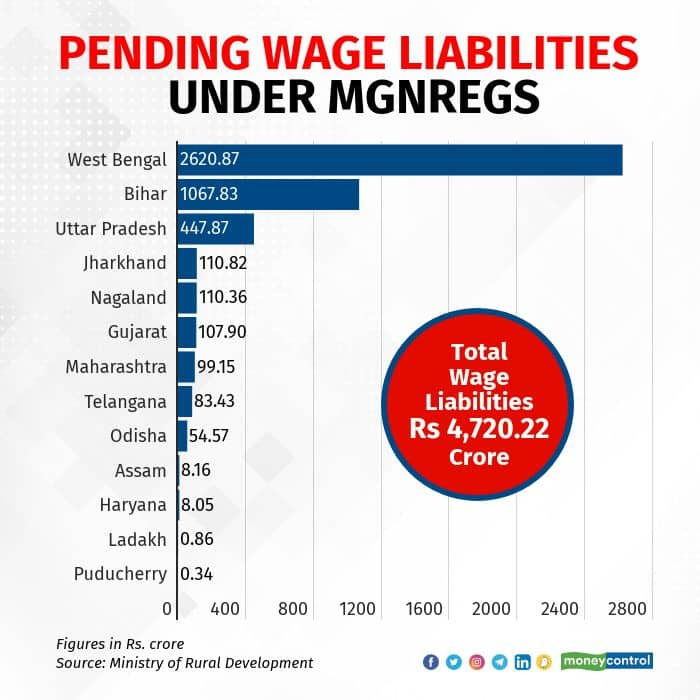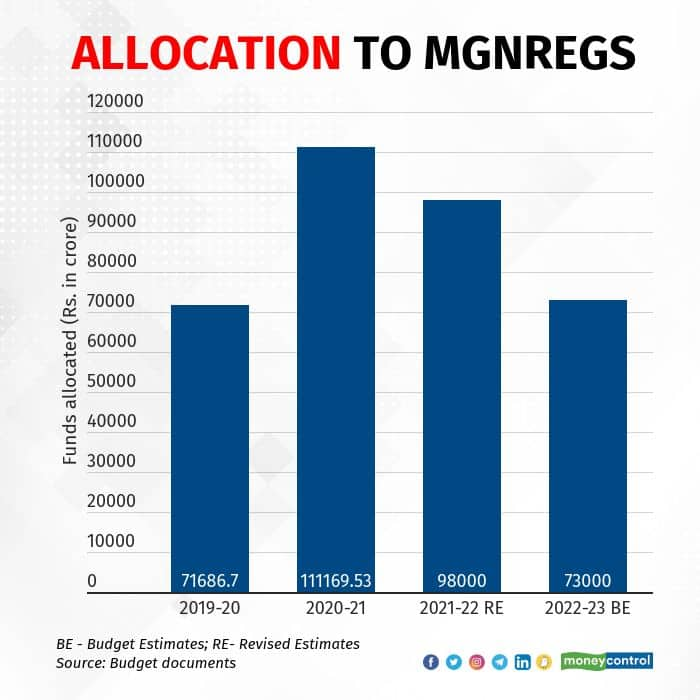



The wage liabilities for the Mahatma Gandhi National Rural Employment Guarantee Scheme (MGNREGS) stood at Rs 4,720 crore as of July 21, said the Ministry of Rural Development.
In a written reply by Niranjan Jyoti, the minister of state for rural development, the pending liabilities under MGNREGS for wage component were highest for West Bengal, which stood at Rs 2,620.87 crore. Bihar came second with Rs 1,067.83 crore as pending liabilities.

The materials cost due for MGNREGS stood at Rs 2,537.32 crore during the same period. Material component liabilities for Karnataka were the highest (Rs 476.18 crore) followed by West Bengal (Rs 343.02 crore).
“Unpaid dues have been a persistent problem with NREGS. The funds released by the Union government get delayed because enough funds haven’t been allocated for the programme,” said Rajendran Narayanan, assistant professor at Azim Premji University and cofounder of LibTech India, a study group focused on improving rural public services delivery.
“The central government has been blaming the states for failing to follow guidelines of the programme to release the funds. And the states are claiming that they have complied with all guidelines. It’s like a tennis match between the Centre and the states,” he added.

According to experts, dues arising from inadequate allocation of funds are preventing the scheme from running at its full capacity.
“By the end of every year, liabilities get piled up because of inadequate budget allocation, and this then gets carried over to the next year. And when the budget allocation gets further cut in the next year, a large chunk of the funds simply gets spent on paying these dues,” said Vijay Ram, a researcher at the People's Action for Employment Guarantee, an MGNREGS advocacy group.
A total of Rs 73,000 crore was allocated for MGNREGS in the 2022-23 budget. This is 25 percent less than the Rs 98,000 crore allocated the previous year, as per revised estimates.
According to the rural affairs ministry, MGNREGS has more than 321 million workers in total under the scheme, making it one of the most important employment generators in rural India. Pending wage and materials liabilities of the scheme can have severe negative impacts on the economy.
“A large section of the people in rural areas are dependent on the public distribution system and MGNREGS for food. At the most, 10 kg of rice is given to a family (under PDS) and that is nowhere enough. With wages from MGNREGS, they can supplement this and have a semblance of food security,” said Ram. “If they are not paid wages on time, the consequences can even be as severe as starvation,” he added.
Discover the latest Business News, Sensex, and Nifty updates. Obtain Personal Finance insights, tax queries, and expert opinions on Moneycontrol or download the Moneycontrol App to stay updated!
Find the best of Al News in one place, specially curated for you every weekend.
Stay on top of the latest tech trends and biggest startup news.